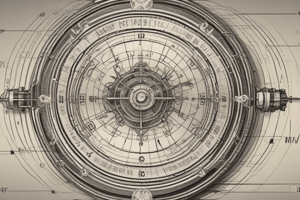Podcast
Questions and Answers
Đơn vị nào được xác định ban đầu là một phần tám mươi của một ngày mặt trời trung bình hoặc buổi trưa?
Đơn vị nào được xác định ban đầu là một phần tám mươi của một ngày mặt trời trung bình hoặc buổi trưa?
- Giờ
- Ngày
- Giây (correct)
- Phút
Đơn vị thời gian cơ bản hiện nay được định nghĩa dựa trên công nghệ nào?
Đơn vị thời gian cơ bản hiện nay được định nghĩa dựa trên công nghệ nào?
- Bức xạ phát ra từ các nguyên tử césium-133 (correct)
- Chuyển động của Trái Đất quanh Mặt Trời
- Quỹ đạo của Mặt Trăng
- Dao động tự do của thiên thạch
Ngoài giây, hệ thống đo lường SI còn bao gồm các đơn vị thời gian nhỏ như thế nào?
Ngoài giây, hệ thống đo lường SI còn bao gồm các đơn vị thời gian nhỏ như thế nào?
- Giây femto (correct)
- Giây nano
- Phút micro
- Phút mega
Nhà thiên văn học sử dụng đơn vị 'năm ánh sáng' để áp dụng cho việc đo lường gì?
Nhà thiên văn học sử dụng đơn vị 'năm ánh sáng' để áp dụng cho việc đo lường gì?
'Nanogiây' là đơn vị thời gian tương ứng với bao nhiêu giây?
'Nanogiây' là đơn vị thời gian tương ứng với bao nhiêu giây?
'Thập kỷ' là bao nhiêu năm?
'Thập kỷ' là bao nhiêu năm?
Thời gian được coi là một chiều trong vật lý vì:
Thời gian được coi là một chiều trong vật lý vì:
Công nghệ giúp con người đo lường và quản lý thời gian hiệu quả thông qua việc sử dụng:
Công nghệ giúp con người đo lường và quản lý thời gian hiệu quả thông qua việc sử dụng:
Lợi ích chính của việc đo lường thời gian là:
Lợi ích chính của việc đo lường thời gian là:
Trong vật lý, hiện tượng thời gian dường như chậm lại khi tiến gần tới tốc độ ánh sáng được giải thích bởi:
Trong vật lý, hiện tượng thời gian dường như chậm lại khi tiến gần tới tốc độ ánh sáng được giải thích bởi:
Đơn vị thời gian cơ bản mà con người sử dụng để đo lường và quản lý cuộc sống hàng ngày là:
Đơn vị thời gian cơ bản mà con người sử dụng để đo lường và quản lý cuộc sống hàng ngày là:
Đơn vị thời gian phức tạp được sử dụng để mô tả những khoảng thời gian dài trong lịch sử Trái Đất là:
Đơn vị thời gian phức tạp được sử dụng để mô tả những khoảng thời gian dài trong lịch sử Trái Đất là:
Flashcards are hidden until you start studying
Study Notes
Facts About Time and Its Units
Time is an abstract concept that we all experience every day. It governs the order of events, and it's often measured in various units to help us understand and organize our lives. Here are some interesting facts about time and its different units of measurement.
The Basic Unit of Time
The most basic unit of time is called a second. However, this was originally defined as one eightieth part of a mean solar day or Noon. Later, when atomic clocks were invented, scientists realized that the length of a second could vary depending on whether the Earth was moving towards or away from the Sun. So, they redefined the second based on the radiation emitted by caesium-133 atoms. Today, there are seven base units for measurements, including the second for time.
The Metric System's Units of Time
In addition to seconds, minutes, hours, days, weeks, months, years, decades, centuries, and millennia, the metric system also includes fractions like thousandths of a minute (milliseconds), billionths of an hour (microseconds), millionths of a minute (nanoseconds), and even smaller units such as femtoseconds and attoseconds. These tiny increments can be useful for measuring extremely short intervals or fast processes.
Non-Standard Units of Time
While the metric system provides standardized units, non-standard measures exist too. For example, astronomers use 'light-years,' which is the distance that light travels in one year, as a measure for distances in space. Another common non-standard unit is the geological timescale, where much longer periods of time are used to describe changes within the Earth's history.
The Difference Between Space and Time
In physics, time is sometimes referred to as a dimension just like length, width, height, etc. This is because time, like these dimensions, has directionality and duration. Unlike other dimensions, however, time has no inherent limit to how far back or forward you can go through it — it only exists between two events. With this understanding of time, physicists have developed theories such as relativity, which explains why time seems to move slower as you approach the speed of light.
Time's Impact on Our Lives
We all experience time passing every day, which may seem like a simple concept, yet it profoundly affects our lives. From the moment we wake up until we go to sleep, each second counts towards making us who we are today. This is why clocks have been invented — so that humans can measure and manage their time effectively.
In summary, time is a fundamental part of our existence, and its measurement is crucial for understanding, organizing, and experiencing our lives. Whether it's through the basic units like seconds and minutes or more complex units like microseconds and geological timescales, time is a concept that continues to fascinate and challenge us.
Studying That Suits You
Use AI to generate personalized quizzes and flashcards to suit your learning preferences.




